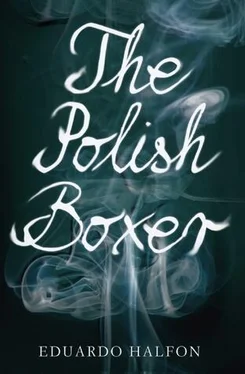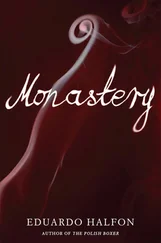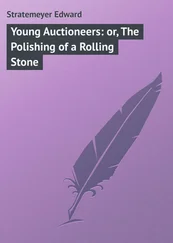Eduardo Halfon - The Polish Boxer
Здесь есть возможность читать онлайн «Eduardo Halfon - The Polish Boxer» весь текст электронной книги совершенно бесплатно (целиком полную версию без сокращений). В некоторых случаях можно слушать аудио, скачать через торрент в формате fb2 и присутствует краткое содержание. Год выпуска: 2012, Издательство: Bellevue Literary Press, Жанр: Современная проза, на английском языке. Описание произведения, (предисловие) а так же отзывы посетителей доступны на портале библиотеки ЛибКат.
- Название:The Polish Boxer
- Автор:
- Издательство:Bellevue Literary Press
- Жанр:
- Год:2012
- ISBN:нет данных
- Рейтинг книги:4 / 5. Голосов: 1
-
Избранное:Добавить в избранное
- Отзывы:
-
Ваша оценка:
- 80
- 1
- 2
- 3
- 4
- 5
The Polish Boxer: краткое содержание, описание и аннотация
Предлагаем к чтению аннотацию, описание, краткое содержание или предисловие (зависит от того, что написал сам автор книги «The Polish Boxer»). Если вы не нашли необходимую информацию о книге — напишите в комментариях, мы постараемся отыскать её.
marks the debut of a major new Latin American voice in English.
The Polish Boxer — читать онлайн бесплатно полную книгу (весь текст) целиком
Ниже представлен текст книги, разбитый по страницам. Система сохранения места последней прочитанной страницы, позволяет с удобством читать онлайн бесплатно книгу «The Polish Boxer», без необходимости каждый раз заново искать на чём Вы остановились. Поставьте закладку, и сможете в любой момент перейти на страницу, на которой закончили чтение.
Интервал:
Закладка:
They walked eight or ten paces in front of me, quickly and without so much as looking to check whether I was following them. I was nervous, and a few times I thought about stopping or running away or finding a taxi to take me back to the safety of the apartment. We passed the Gardoš tower. Then we passed a little park and I thought I saw a white horse tied to the trunk of a tree, bending its head to graze. Impossible, I thought, Bebo’s last words still echoing in my head. But the white shape in the night was still there. At some point, it started to snow. It seemed we left Gardoš and then it seemed we left Zemun and then, somehow, it seemed we left Belgrade. But I could still make out the putrid smell of the Danube or the Sava, whichever it was, and so I was able to orient myself, and for a few blocks we didn’t see a single person. No one. We walked into a dark alley and, of course, they soon stopped. I reached them. One of them asked me for a cigarette by tapping his fingers to his lips. As he lit it, the other felt my jacket and said something in Serbian or maybe in Romany. Then they kept walking and, who knows why, I followed four paces behind them, as if I were being dragged along by some strange tide. I also lit a cigarette, trembling a little. I blew out a mouthful of cold smoke. Sometimes, I suppose, hope is stronger than fear.
We arrived at a huge rusty door in what felt like an industrial district. There was no light. There was no sign. There wasn’t a soul on the street. There was no sound. No music, no voices, nothing. The snow kept falling. One of them banged hard on the door and shouted something incomprehensible at me, and I thought again about making a run for it. They both laughed. Suddenly, I heard the door creaking. A huge mustachioed man dressed in black appeared through the opening and greeted the two Gypsies, kissing them on the cheeks. He stood looking at me. The two Gypsies started explaining why I was there and he shook his head, as though disappointed, while making a clicking sound with his tongue that in every language in the world means no. One of the Gypsies said something to me, something that probably meant: see, we told you. And the guy in black let them past. Dinars, I said, taking out some bills, probably too many bills, and the guy snatched them from me irritably. Then he shouted something, spat a gob of phlegm at the ground (although it was dark, so I couldn’t be sure), and shut the door with a single shove.
I was alone, lost in the middle of who knows where, and almost out of money. It was still snowing. I clenched my jaw to keep from shivering, and maybe to keep from crying. I folded my arms. I lit a cigarette and tried to imagine what was on the other side of the door. I couldn’t imagine anything. I told myself it was probably an abandoned warehouse or a textile factory or just a big rusty door for screwing money out of stupid, credulous tourists. I shut my eyes and, just for a moment, from far off, I thought I heard music. But no. Nothing. Just my imagination.
Twenty or thirty minutes later, the door opened again. The guy in black put his head out and shouted something at me and then went quiet, apparently waiting for a reply. What d’you want? I said in Spanish, raising my gloved hands toward the sky. I thought of giving him my money. I thought of running into the building. He shouted at me again, still furious, still waiting for a reply. I don’t know from where, and I don’t know why, but Stravinsky and San Francisco and the Golden Gate Bridge came into my mind and so, without even thinking it through, I said to the guy I phuv kheldias. His face softened. He didn’t smile, but nearly. Earthquake, I whispered to him in Spanish, my favorite postcard. I phuv kheldias, he said, as though helping me to pronounce it correctly. I said it again, offering him a cigarette. He took the whole pack, and still kind of annoyed, said I phuv kheldias, I phuv kheldias, like that, twice, as though it was some secret key. Then he moved to one side and, with a generous sweep of his hand, invited me in.
It was darker inside than out. I shook the snow off myself. Nervously, I started to walk forward. I looked back, asking him for help or reassurance or something, and the guy in black, with another movement of his hand, indicated that I should just keep going forward. And so I kept walking, slowly, terrified, feeling as if I were in a film, but I wasn’t sure what kind. A romance film, I thought. A thriller, I thought. I could feel the unfathomable emptiness around me, the total absence of everything. The only sound was the metal sheeting of the roof as it crashed against the rafters. Suddenly, the darkness deepened and my steps became shorter, clumsier, and more hesitant. I put my arms out, expecting to find at any moment a wall, a door handle, a person, something, anything I could touch. I sighed and thought I heard the echo of my own sigh. Then I thought I heard the scuttling of a rat. Then I thought I heard a shout. Then I thought I heard a bit of music hidden in some distant hissing. But no. I wanted to talk, to say something, in order to feel part of the world again, but in that situation words didn’t belong to me anymore. I had gone beyond language. Beyond any rational concept. Beyond myself. Beyond any understanding of what was happening. Beyond any god or doctrine or gospel or borderline between one thing and another. Just beyond.
My hands quickly came up against something. I banged hard with my fist, almost desperately, and a heavy door opened right in front of me, a door I hadn’t even suspected was there. And before I knew it, I was inside and the door had shut behind me. I didn’t have time to decide anything. When it’s important, when it really matters, you never have time to decide anything.
I stayed still, trying to figure out where I was, what I’d gotten myself into. But there was too much smoke, and a faintly orange light like the dawn. It was a large, hot room. There were Gypsies standing, others leaning against walls or sitting on plastic or leather chairs. They were drinking. They were smoking. They were talking loudly. The ceiling was very low and the few yellowish lightbulbs were strung up like little hanged men, bouncing gently from the commotion or perhaps just out of habit. Everything had a sepia glow to it, but a weathered, opaque sort of sepia. In the main room were some steps going up and a number of passageways with small doors that people went in and out of as though it were part of some dubious game. Some Gypsies shouted something to me. I smiled at them and started to walk aimlessly through the smoky yellowish light. I realized (or I realize now) that the whole scene was shaded with a sort of forbidden tinge, a secretive tinge, the tinge of a speakeasy in 1930s Harlem. There was smoke everywhere, as though flooding over us, as though drowning us, as though everything were made of smoke, begun in smoke.
Sitting in a corner, an old man wearing rags and with an elfin face was holding his drink. He beckoned for me to come over. I hesitated, and the old man summoned me again. I walked slowly toward him. His teeth were black. He asked me something in Romany. Music, I said to him. He frowned. Music, music. The old man started to laugh. He shouted something. I felt watched by everyone else, and I don’t know why, but until then I hadn’t realized that there were only Gypsy men around me, not a single woman. The old man handed me his glass and, with another gesture of his hands, told me to drink. It tasted of brandy. I gave him the glass back and he continued talking to me as though I understood him. I shrugged. He clapped a few times and at that moment, from way off somewhere, from a different room, the sound of a piano started up. I stood there quietly. Was it a piano? It was definitely a piano. I excused myself with a weak smile.
I walked slowly through the room and then down one of the passages until I got to a half-closed door. I could still hear the muted sound of the piano. I opened the door and, dimly, like in a faded dream or in a faded dream sequence from an old film, I saw a woman putting on her makeup or brushing her hair in the mirror. She turned toward the door and stuck her tongue out at me, and I felt a primal sort of fear and slammed the door and walked back a few paces and nearly fell over. At the end of the passage, a man with gray hair shouted something at me. He looked angry. I ignored him. Without thinking about it, I tried to open another door, but it was locked. The gray-haired man carried on insulting me. I managed to open a smaller door. It was a lightless room, or rather one with only the frail glow of a solar eclipse. It smelt of hashish, of gangrene, of wet laundry. Sitting on a stool, a plump red-haired girl with her freckled breasts out was putting her stockings back on. She smiled, gestured for me to come in, her mouth open, with the look of a slippery rattlesnake, and it dawned on me that I was in a brothel. Was I in a brothel?
Читать дальшеИнтервал:
Закладка:
Похожие книги на «The Polish Boxer»
Представляем Вашему вниманию похожие книги на «The Polish Boxer» списком для выбора. Мы отобрали схожую по названию и смыслу литературу в надежде предоставить читателям больше вариантов отыскать новые, интересные, ещё непрочитанные произведения.
Обсуждение, отзывы о книге «The Polish Boxer» и просто собственные мнения читателей. Оставьте ваши комментарии, напишите, что Вы думаете о произведении, его смысле или главных героях. Укажите что конкретно понравилось, а что нет, и почему Вы так считаете.












